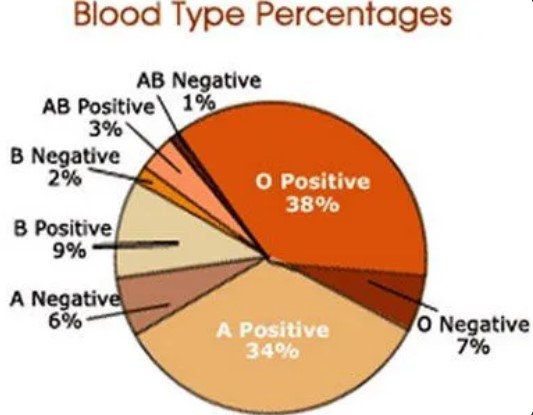Blood, the life-sustaining fluid coursing through our veins, has long captured the fascination of scientists, historians, and enthusiasts alike. Among its many enigmatic facets lies the intriguing tale of Rh-negative blood—a peculiar subtype that has perplexed researchers for decades. Delving into the annals of history, we uncover a narrative woven with ancient mysteries, evolutionary puzzles, and scientific inquiry. Join us as we embark on a journey to explore the captivating history of Rh-negative blood.
The Discovery: The story of Rh-negative blood begins in the early 20th century with the groundbreaking work of Karl Landsteiner, an Austrian immunologist who identified the ABO blood group system in 1901, revolutionizing transfusion medicine. Building upon Landsteiner’s discoveries, subsequent researchers observed another antigen present on the surface of red blood cells—the Rh antigen.
In 1939, Landsteiner and his colleague Alexander Weiner made a seminal discovery when they identified the Rh factor, named after the Rhesus monkey in which it was initially detected. They found that some individuals lacked this antigen, leading to the classification of blood types as Rh-positive or Rh-negative.
Origins and Evolution: The origins of Rh-negative blood remain shrouded in mystery, sparking numerous theories and speculations. Some researchers propose that Rh-negative blood may be a relic of ancient human populations, tracing its lineage to prehistoric times. This hypothesis suggests that Rh-negative individuals may have descended from an ancient ancestor who lacked the Rh antigen.
Others postulate that Rh-negative blood could be the result of genetic mutations or evolutionary adaptations. Certain studies have linked the prevalence of Rh-negative blood to specific regions and populations, such as the Basque people of Spain and the Berbers of North Africa, fuelling speculation about its ancestral roots.
Genetic and Scientific Advances: Advancements in genetics and molecular biology have shed new light on the origins and characteristics of Rh-negative blood. Research has identified several genes associated with the Rh antigen, offering insights into the genetic mechanisms underlying its inheritance and expression.

Studies exploring the prevalence of Rh-negative blood across different populations have revealed intriguing patterns and distributions. While Rh-negative blood is relatively rare in most populations, certain ethnic groups exhibit higher frequencies, sparking curiosity about the factors driving this variation.
Mysteries and Speculations: Despite decades of research, the enigma of Rh-negative blood continues to elude complete understanding. Its association with various traits and phenomena, ranging from heightened psychic abilities to alien ancestry, has spawned a plethora of myths and conspiracy theories.
Some proponents of alternative theories suggest that Rh-negative blood holds mystical or extraterrestrial significance, attributing supernatural powers or connections to ancient civilizations. However, such claims lack scientific evidence and are often dismissed by mainstream researchers.
The history of Rh-negative blood is a tapestry woven with scientific inquiry, evolutionary puzzles, and cultural intrigue. From its discovery in the laboratories of pioneering immunologists to the mysteries that continue to captivate the imagination, Rh-negative blood remains a fascinating enigma that underscores the complexity of human biology and evolution.
As researchers continue to unravel the genetic and physiological underpinnings of Rh-negative blood, it is essential to separate fact from fiction and approach the subject with rigorous scientific scrutiny. While the allure of ancient mysteries and speculative narratives may hold appeal, the pursuit of knowledge grounded in evidence remains paramount in unraveling the secrets of Rh-negative blood.
Further exploration into the origins and implications of Rh-negative blood has led scientists down a path of genetic investigation, aiming to uncover the underlying mechanisms and potential implications of this unique blood type.
Genetic studies have revealed that Rh-negative blood is inherited in a Mendelian recessive manner, meaning that both parents must carry the gene for a child to express the Rh-negative phenotype. This understanding aligns with conventional genetic principles and provides a framework for understanding the inheritance patterns observed in families and populations.
In addition to its inheritance patterns, researchers have also investigated the potential health implications associated with Rh-negative blood. While some studies have suggested correlations between Rh-negative blood and certain health conditions, such as autoimmune disorders and cardiovascular diseases, the evidence remains inconclusive and subject to further investigation.
The prevalence of Rh-negative blood varies significantly across different populations and geographic regions. For example, the Basque people of Spain and the Berbers of North Africa exhibit higher frequencies of Rh-negative blood compared to other populations. Understanding the factors contributing to these variations, such as genetic drift, migration patterns, and natural selection, remains a topic of ongoing research.
Moreover, the cultural and societal significance attributed to Rh-negative blood adds another layer of complexity to its history. From ancient myths and legends to modern-day conspiracy theories, Rh-negative blood has captured the imagination of individuals around the world. Exploring the cultural narratives and beliefs surrounding Rh-negative blood provides valuable insights into the intersection of science, folklore, and human psychology.
As we continue to unravel the mysteries of Rh-negative blood, it is essential to approach the subject with scientific rigor and critical thinking. While the allure of speculation and conjecture may be enticing, it is only through evidence-based inquiry that we can truly understand the origins, implications, and significance of this fascinating blood type.
In conclusion, the history of Rh-negative blood is a multifaceted tale that spans centuries of scientific discovery, cultural intrigue, and genetic exploration. From its humble beginnings in the laboratories of pioneering researchers to the complex narratives and beliefs that surround it today, Rh-negative blood continues to captivate the imagination and challenge our understanding of human biology and evolution. As we embark on this journey of exploration and discovery, let us remain vigilant in our pursuit of truth and knowledge, guided by the principles of scientific inquiry and intellectual curiosity.



Leave a Reply
Want to join the discussion?Feel free to contribute!